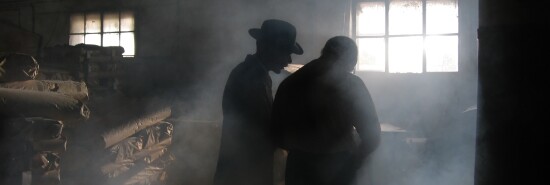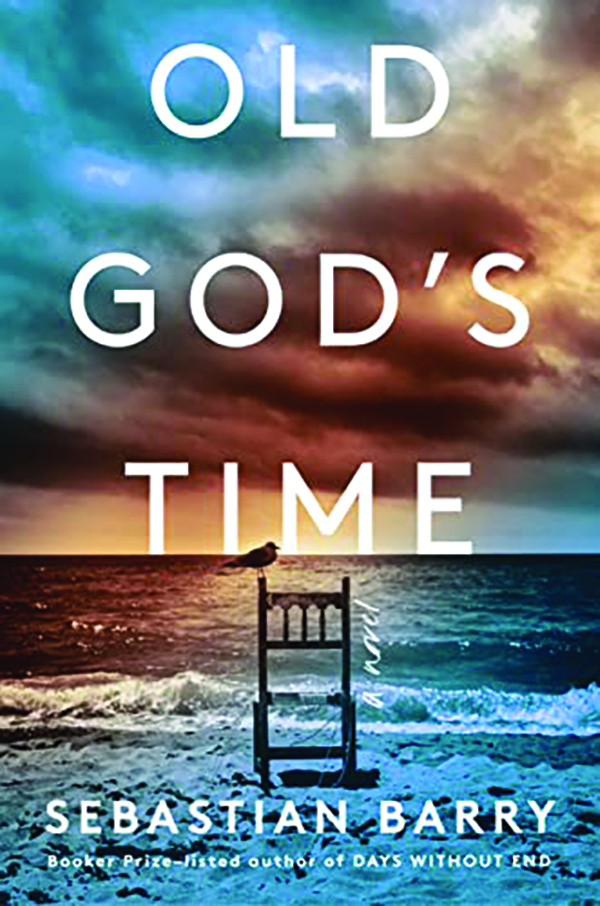
Sebastian Barry is a detective investigating the human condition
Malcolm Forbes
Sebastian Barry’s most captivating novels feature Irish men and women who have ventured far and wide and now look back on the jagged course of their lives to make sense of what they did, whom they loved, how far they have come, and how much they have lost. Many of those characters stem from two fictional families, the McNultys and the Dunnes. Some are based on the Dublin-born writer’s distant relatives. All are well-rounded, vividly realized creations who help tell a good story while simultaneously amplifying or articulating something of profound significance, whether a dark aspect of Irish history or a key facet of the human condition.

In The Secret Scripture, Barry’s 2008 Booker Prize-shortlisted novel, Roseanne McNulty, a “remnant woman” in a mental asylum, writes her “testimony of herself” and in doing so illuminates upheavals in Ireland’s past and present. In On Canaan’s Side (2011), 89-year-old Lily Bere weathers the pain of a broken heart and casts her mind back seven decades. Jack McNulty, the protagonist of The Temporary Gentleman (2014), hangs around in Ghana in 1957, wrestling with his demons while plucking up the courage to return home to Ireland “a better man, a mended man.” And in Barry’s acclaimed work from 2016, Days Without End, Irish emigrant Thomas McNulty sifts memories of fleeing his homeland, fighting in America’s Indian Wars and Civil War, and finding love with fellow wanderer John Cole.
Barry’s latest novel, his ninth, is another backward glance at an eventful life. On this occasion, though, Barry has attempted something more ambitious. The protagonist of Old God’s Time is not just flawed; he is damaged after being knocked off track by a series of calamitous personal blows. The reader is forced to tread carefully and determine which of his relayed experiences are real and which are in fact muddled thoughts or misconstrued remembrances. In a lesser writer’s hands, this approach could have been frustrating. However, Barry, a master, provides a reading experience that is stimulating and engrossing.
The bowed but not yet beaten hero is 66-year-old retired policeman Tom Kettle. For the last nine months, he has been living as a recluse in a lean-to annexed to a Victorian castle in Dalkey. He spends long, lazy days seated in his wicker chair, smoking cigarillos and gazing out at the Irish Sea. He rarely sees anyone and hasn’t been to the island “skulking in the near-distance.” For him, being “stationary, happy and useless” is the whole point of retirement.
One stormy night, his peace is shattered. Two young detectives from his old division turn up at his door unannounced. He invites Wilson and O’Casey in and listens to their appeal for help on a cold case concerning a pair of priests suspected of sexually abusing children — “two jackals in a coop devouring little chickens.” One of the priests was brutally murdered, and Tom was the investigating officer at the time. Today, though, he considers the case ancient history and is reluctant to answer his former colleagues’ questions and rake over old ground.
Packed with intrigue and suspense and revolving around a man in self-imposed exile confronted by blasts from his past, Barry’s opening chapters feel like the beginning of a John le Carre novel. But after setting his preliminary scenes, Barry abruptly changes tack, swapping traditional thriller territory for an entirely different state of play. For it is at this point that it becomes apparent to us that Tom has a faltering mind that issues forth jumbled ideas, fractured memories, and clouded judgments.
We get our first inkling that he is not to be trusted when his frantic thoughts turn to his children. He has led us to believe that they are alive and well. But after Wilson and O’Casey’s unsettling visit, Tom remembers that his children are unable to give him comfort and guidance: Winnie is dead and Joseph was murdered in Albuquerque. Also cruelly cut out of his life is his dearly departed wife, June.
After an aborted suicide attempt, Tom picks himself up, dusts himself off, and decides to assist the police with their inquiries. Barry blends in crime-novel components: Tom discovers that Wilson and O’Casey took away his toothbrush to obtain a DNA sample; he is later asked outright by a police chief if he killed the predatory priest. But just when we think the novel will turn into a murder mystery, Barry topples our expectations again by taking us away from the investigation and into Tom’s mind.
His wide-ranging, free-wheeling thoughts throw light on his past. We learn of his early years, during which he was routinely blunted and blighted by trauma. As a young boy, he suffered at the hands of priests in various Catholic institutions. After “the shames and shambles of his childhood,” he was scarred by his service in Malaya as a trigger-happy sniper in the British Army. Then, as a police officer, he needed medical help to cope with the aftershock of witnessing, and surviving, a bomb attack.
Tom’s mind also replays more joyful memories, including the precious time he spent with his children. One person dominates his thoughts: “that perfected woman, his ideal, rows and ruckus and contentions be damned, the beauty he measured all other beauties by, his rule, his template, the eternal shiningness of June.”
Tom’s streams of consciousness come as torrents, but his recollections and daydreams within them are fragmentary, nonchronological, and full of detours and dead ends. “Sometimes his head was like a wild horse, without bit or rein,” Barry writes. One minute Tom is mulling over the case, the next, he is musing on his fallen friend and police partner Billy Drury or meditating on his own mortality or recounting the role priests played in June’s life. Gradually, the details form a bigger picture, one that fills in the gaps in Tom’s backstory and reveals the devastating circumstances that have rendered him lost, lonely, grief-ravaged, and guilt-ridden. These circumstances now threaten to take away what little stability he has left.
Old God’s Time is another triumph for Barry, but it isn’t quite faultless. Some of Tom’s idiosyncrasies are plain silly, such as his refusal to turn on the light when going to the bathroom in the night for fear of disturbing his furniture: “Chair and table, carpet and knick-knacks, wanting to be alone, like Greta Garbo.” Also, one narrative strand about Tom’s neighbor and her violent husband is undeveloped and consequently uninvolving.
However, these infelicities are overshadowed by the novel’s many strengths, chief among them Barry’s exquisite prose. As ever, he impresses with his lyrical descriptions. A nickel tray “improved to silver in the light.” A night sky “looked shocked and empty, as if not fully trusting that the moon would rise soon and her cohorts of stars crowd in like figures at a hajj.” When Tom’s thoughts aren’t churning, his mind is “strangely blank, like a window at the wrong angle to the daylight.” The sprinkling of Irish vocabulary — girleens, gossoons, hollier, gurrier, scutty, gluaistean — enriches and authenticates the proceedings.
But the book’s main highlight is its central character. “A soul like him left on earth without the person he had loved — what sort of creature was that?” asks Barry. Tom manages to be many things: He is “the orphan of his former happiness” and “the guardian of his own silences,” “a citizen of grief” and “a pensioned ghost from the strange past.”
Tom may be a lost cause, and he may offer an unreliable testimony, but we still follow his thoughts and deeds, and we root for him, this “old policeman with a buckled heart,” every step of the way.
Malcolm Forbes has written for the Economist, the Wall Street Journal, and the Washington Post. He lives in Edinburgh.
